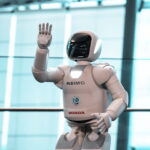A system is anything that we can draw a boundary around, observing and characterizing the behavior it exhibits. All systems behave according to the laws of physics but if the system has the ability to respond to feedback or sensory information, the range of possible behavior starts to expand. If the system has computing capability, the possible behaviors can expand even more. If the system has memory and the ability to learn, the range of possible behaviors become effectively limitless.
When we look at the behavior a system is exhibiting, we can infer and compare the system’s intelligence to our understanding of our own intelligence. This enables us to assign our perceived level of intelligence to the system. While we typically think of intelligent systems as computers controlling machines, any system exhibiting behavior can be assigned the quality of intelligence and thought of as an intelligent system. Obviously some systems have more intelligence than others.












No Intelligence Systems
Systems with no intelligence are systems that simply follow the laws of physics. A solar system or galaxy for example exhibit predicable behavior as does most natural phenomena. If we draw our system boundary around a rock, it can be used as a weapon but it is literally “dumb as a rock.” Physical systems such as tools, weapons and simple machines are designed to produce specific behavior but possess no intelligence and are intended to be controlled by a separate intelligent system.
Limited Intelligence Systems
Systems that can sense their own behavior and use the information to better control their actions, exhibit limited intelligence. For example cruise control on a car, a traffic signal at an intersection, an insect or an alligator are all able to respond to their environment, but their programming and memory are effectively hardwired so they are not able to learn.
Intelligent Systems
If we push a bit further along the intelligence spectrum, systems like cars, robots and pets can use their memory of experiences to adapt and learn. They are able to process information out of their short-term memory into learned knowledge in their long-term memory where it can be used to better manage behavior in the future. They are generally able to model the world around them, recognizing themselves and others, which enables them to take part in collective behaviors like those exhibited by herds or traffic systems. Importantly, both systems with individual behavior, for example a buffalo, and systems with collective behavior, for example a herd of buffalo, can each be assigned their own level of intelligence based on their observed behavior.
Highly Intelligent Systems
Finally at the far end of the intelligence spectrum are highly intelligent systems like humans or systems that involve humans exhibiting collective behavior, for examples businesses, governments or religions. Because our definition of intelligence is based on comparison to our own intelligence the conclusion is kind of obvious but it’s not much of a stretch to think of dolphins or pods of dolphins as highly intelligent as well. It’s not just our amazing memory and our ability to learn but we have language and communication enabling us to learn second-hand from others’ experiences. As humans our opposable thumb gives us a leg-up creating and using tools, weapons and technology in general. However, current information technology is the big disrupter with internet communication and massive amounts of computer memory effectively augmenting our abilities individually and even more so collectively. We are living in unprecedented times with technology changing everything, forcing us to learn to keep up.
What About Artificial Intelligence (AI)
Our genre of dystopic movies like “Terminator” work because they trigger fear that someday we may all be working for our machine overlords or worse machines will take over the world eliminating humans. A computer controlling a machine is essentially no different than a brain controlling a body where both are intelligent systems. If we play that through, we can think of a computer controlling a machine equivalent to a new species of animal. How intelligent is it? Let’s assume that its intelligence is adequate for it to function independently out in the wild, then it will have to function within the boundaries set by all the other intelligent systems that exist in the world. If it can’t play nice or attempts to organize in a way that isn’t safe, it won’t be around long. Humanity has gone out of it’s way to get rid of human overlords, so I’m not seeing why it would ever tolerate machine overlords.
Fantasy can be fun but reality is what actually happens. Check out PPCR on the main menu tab for a deeper dive.